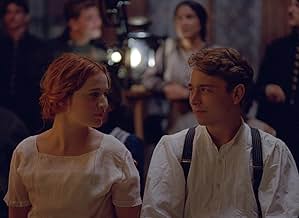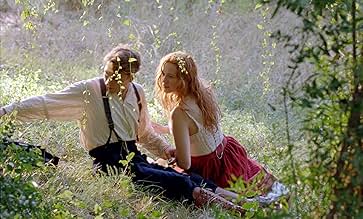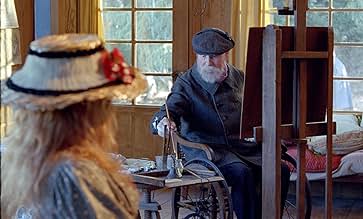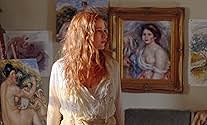अपनी भाषा में प्लॉट जोड़ेंSet on the French Riviera in the summer of 1915, Jean Renoir -- son of the Impressionist painter, Pierre-Auguste -- returns home to convalesce after being wounded in World War I. At his side... सभी पढ़ेंSet on the French Riviera in the summer of 1915, Jean Renoir -- son of the Impressionist painter, Pierre-Auguste -- returns home to convalesce after being wounded in World War I. At his side is Andrée, a young woman who rejuvenates, enchants, and inspires both father and son.Set on the French Riviera in the summer of 1915, Jean Renoir -- son of the Impressionist painter, Pierre-Auguste -- returns home to convalesce after being wounded in World War I. At his side is Andrée, a young woman who rejuvenates, enchants, and inspires both father and son.
- पुरस्कार
- 3 जीत और कुल 11 नामांकन
- La boulangère
- (as Annelise Heimburger)
- Le brocanteur
- (as Thierry Hancisse de la Comédie Française)
- Servante Collettes
- (as Cecile Rittweger)
फ़ीचर्ड समीक्षाएं
Veteran French actor Michel Bouquet captures the essence of a 74 year old Pierre-Auguste Renoir, a master Impressionistic artist. By this time (1915), Renoir is in constant pain and continues painting despite his gnarled hands courtesy of severe arthritis. He has relocated to Cote D'Azur (the French Riviera) to leave in peace with nature and the warmer weather. His estate is gorgeous and provides the backdrops for many paintings. We meet his newest model, 15 year old Andree Heuschling (Christa Theret). Her spirit inspires not just Renoir the artist, but also his son Jean (Vincent Ruttiers), sent home to recover from his WWI injuries.
Both father and son seem to objectify the beautiful and spirited Andree, neither being capable of an adult and equal personal relationship. The frustration with this movie stems from its unwillingness to offer anything other than observations of its characters. It meanders through days with no real purpose or insight. This despite having subjects that include one of the greatest artists of all-time and his son, who went on to become a world famous movie director. The story, if there is one, just kind of lays there flat, surrounded by beautiful colors and textures.
Auguste Renoir died in 1919, but earlier that year managed to visit the Louvre and view his own paintings hanging in the majestic halls. Jean Renoir married Andree and cast her in his first silent films (as Catherine Hessling). When the films flopped, they divorced. She went on to a life of obscure poverty, and he directed two of the greatest films in history: Grand Illusion and The Rules of the Game.
Alexandre Desplat provides another fine score, leaving us lacking only a story or point to the film. To learn much about Pierre-Auguste Renoir, it is recommended to read the biography his son Jean wrote.
While it's definitely not for those who strongly favor conventionally plotted drama or fast action, RENOIR consists of immediate realism and puts you right with the Renoir clan on the French Riviera. It's the sort of film that could easily have been made overly artsy and dull, but it's neither.
The entire story takes place in 1915, toward the end of Renoir's life. The relationship between model Andrée Heuschling and son Jean Renoir is, in many ways, more the subject of the story than the painter himself, yet Renoir himself is indispensable as "the boss," a sort of god-like backdrop to the entire cast and story. Having said that, I must add that there is a fair amount on Renoir's artistic processes, and his philosophizing can be applied to all sorts of art-forms as well as painting. One of RENOIR's strongest aspects is its portrayal of a man who is obsessed with his work and has one thing which utterly engulfs and consumes him.
Like many French films, RENOIR succeeds in breaking all sorts of rules. Among them:
--The plot is meandering and somewhat slice-of-life but still gripping;
--Andrée, the "girl from nowhere," and free but neglected youngest son Coco are characters that beg to be developed further, but at the same time, perhaps it's better that they remain mysterious;
--Lots of female nudity without it seeming the least bit gratuitous: After all, the subject is an artist who often painted naked girls;
--The mood is a successful mesh of somberness, poignancy, and (often laugh-out-loud) humor.
Just about every artsy cliché could be applied to this film, but suffice it to say that it is a beautiful experience. Even simple colors come alive here for the audience as they did for Renoir himself. I'm a word person who's never been a big painting aficionado, but this film made me see the visual arts in a whole new light and may even have converted me to some extent. The soundtrack--quiet, unobtrusive piano scores in the background--also does a great deal to carry this film.
One idea which popped into my head while watching this was that Renoir the painter was something of a womanizer, in that he ended up having affairs with his models. This makes me wonder what the #METOO crowd would say about that. Or maybe it´s okay when someone has been dead for a century? My own view is that works of art should not be shunned on the basis of moral judgment of their creators. I was shocked, for example, when Hachette recently refused to publish Woody Allen´s memoir. Would they also advocate for destroying his brilliant films?
Anyway, I recommend this film. It is slow, but intentionally so.
Andrée is a free spirit. She has no problem posing in the nude, but she makes it clear to everyone that she is a paid model. She has no intention of posing for the honor of it, nor is she ready to become a cook or a maid, as have other models before her.
Naturally, Jean is drawn to the beautiful young woman, and the plot revolves around the relationships among and between the three main characters.
This is an extraordinarily beautiful movie, filmed on the scenic Côte d'Azur. War is raging elsewhere in France, but life is peaceful in this region. The pace of the film reflects the pace of life at the time--quiet and slow.
This is a film worth seeing, based on historical fact, and suggesting what motivated the younger Renoir to become the extraordinary film director that he was. For some reason, the IMDb weighted average of this film is a dismal 6.6. (The ratings themselves are much higher, but the weighting system brings the number down.) Don't be discouraged by the low rating. This is a movie worth seeking out and seeing. It will work better in a theater, but, if necessary, see it on DVD. It will repay your viewing.
क्या आपको पता है
- ट्रिवियाOfficial submission of France to the Oscars 2014 best foreign language film category.
- गूफ़When Pierre-Auguste walks in on Jean Renoir being bathed, a modern toggle-style light switch is visible on the wall. The toggle switch wasn't invented until 1917, which is a few years after that part of the film. Earlier light switches were push-button style, and the switch on the wall is also of a modern plastic style that is very much later.
- भाव
Pierre-Auguste Renoir: You're rather modest for an actress.
Andrée Heuschling: Actress doesn't mean whore.
- कनेक्शनFeatured in Fandor: Cannes You Dig It? | Fandor Spotlight (2022)
- साउंडट्रैकShimmy Dédée
By Patrick Artero
Performed by Patrick Artero, Philippe Baudouin, Francis Guero, André Neufert and Michel Queraud
टॉप पसंद
- How long is Renoir?Alexa द्वारा संचालित
विवरण
बॉक्स ऑफ़िस
- US और कनाडा में सकल
- $22,93,798
- US और कनाडा में पहले सप्ताह में कुल कमाई
- $65,194
- 31 मार्च 2013
- दुनिया भर में सकल
- $78,16,573
- चलने की अवधि
- 1 घं 51 मि(111 min)
- रंग
- ध्वनि मिश्रण
- पक्ष अनुपात
- 1.85 : 1
































